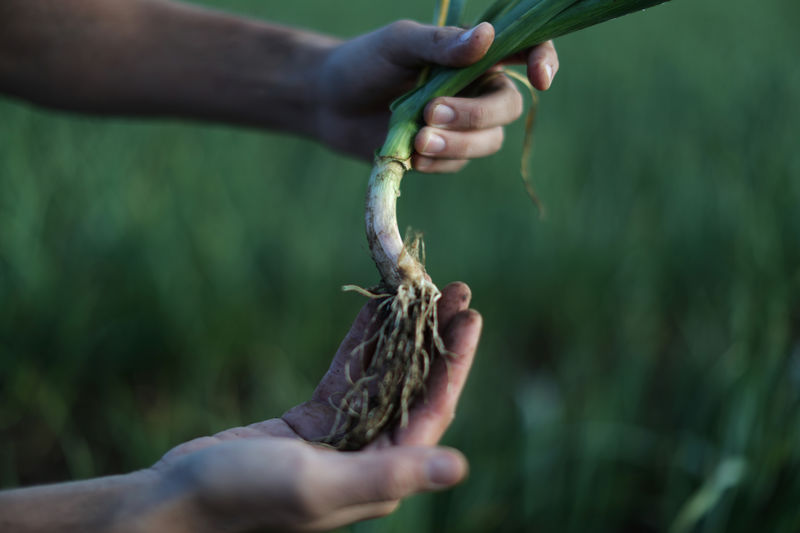By Lucy Nicholson and Richa Naidu
GILROY, California (Reuters) - Unlike millions of other U.S. farmers, garlic growers are profiting from the trade war with China and have cheered President Donald Trump's latest economic attack accordingly.
Sales of California-grown garlic are now increasing after decades of losing ground to cheaper Chinese imports. Sales are poised to get even better as Chinese garlic faces even higher tariffs, with no end to the trade war in sight.
"In a perfect world, we'd love to see the tariffs stay on forever," said Ken Christopher, executive vice president of family owned Christopher Ranch, the largest of three remaining commercial garlic producers in the United States.
While many farmers are suffering through the trade war because they relied heavily on imports to China, U.S. garlic growers benefit because they rely overwhelmingly on domestic sales.
Tariffs on Chinese garlic increased from 10 to 25 percent on May 9, when the U.S. hiked tariffs on $200 billion of Chinese goods and dashed hopes that a U.S.-China trade deal could come soon.
While soybean farmers in the U.S. Midwest watched silos fill with unsold crops as top buyer China all but stopped purchases, Christopher Ranch saw domestic garlic sales rise 15 percent in the last quarter of 2018 after the U.S. applied a 10 percent tariff on imports of Chinese garlic in September.
Then Trump ordered even higher tariffs this month after trade talks broke down when China backtracked on a host of issues crucial to U.S. officials.
The escalation came just a few weeks before the U.S. garlic harvest.
"The timing couldn’t be better for us," Christopher said. "We anticipate a surge in demand for California garlic in the coming weeks."
Christopher, 33, whose farm has 59,000 acres of grass-like garlic fields in Gilroy, California, traveled to Washington D.C. in July to urge the Trump administration to include garlic in the list of imports that would face tariffs.
In lobbying for tariffs, Christopher follows in the footsteps of his father, who fought to implement an anti-dumping duty of up to 400 percent on Chinese garlic in the 1990s.
"We understand in a broader economic sense that a trade war is not in the U.S. best interest," he said, "But since the tariffs were happening anyway, we needed to be sure that garlic was part of the equation."
Not everyone is a fan of the garlic tariff. While Christopher was testifying in favor of tariffs to congressional committees, executives from one of the world's top seasoning companies, McCormick & Company (NYSE:MKC) Inc., were arguing against them.
McCormick says its recipes mostly rely on Chinese garlic, calling it a different product from what is grown in the United States.
“They’re not substitutable," CEO Lawrence Kurzius told Reuters in an interview. "Just like wine, origin matters and terroir matter.”
Taste differences aside, California garlic has traditionally sold at far higher prices than Chinese garlic. It now sells for about $60 per 30-pound box on the wholesale market, according to Christopher. Until recently, Chinese garlic sold for $20 per box, but that has risen to $40 with tariffs and will likely soon rise further, he said.
The new profits U.S. garlic farmers have enjoyed from tariffs are an exception in the U.S. farm sector.
China last year retaliated to Trump's tariffs with duties on U.S. goods including soybeans, corn and pork.
Trump has pledged up to an additional $20 billion in aid to help U.S. farmers hurt by the prolonged dispute after groups such as the American Soybean Association criticized the failure to reach a deal. That's on top of $12 billion the administration promised last year to compensate farmers for trade-war losses.
The trade war has also left many West Coast specialty crop farmers, like nut and cherry growers, scrambling to find alternative markets after China imposed steep duties on imports that made their products too expensive to sell there.
Jamie Johansson, an olive farmer and president of the California farm bureau - which represents 400 crops and 36,000 members - said the Trump administration had put California farmers in the middle of tariff wars with four of the state's five top markets, including China.

"Among our members, I have not heard of anyone benefiting from the current trade war and tariffs," Johansson said.
(Additional reporting and writing by Caroline Stauffer; Editing by Simon Webb and Brian Thevenot)